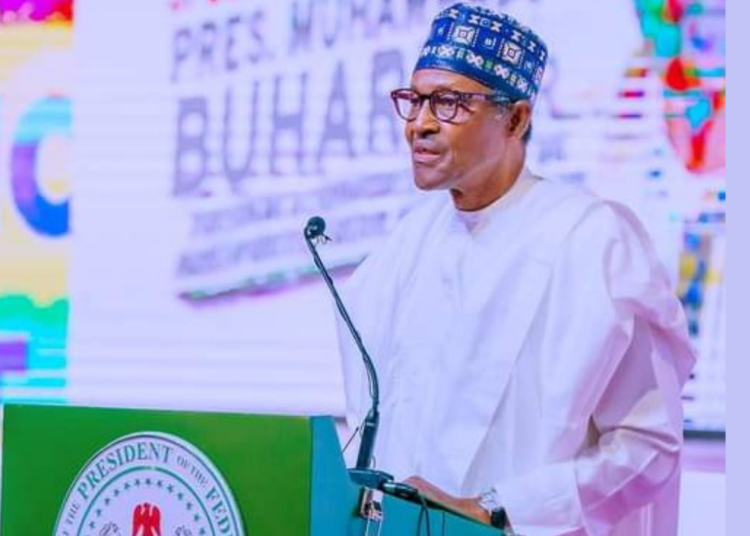President Muhammadu Buhari’s tenure as the leader of Nigeria has been marked by a series of ambitious projects aimed at improving the country’s infrastructure and promoting economic development.
Among these projects are several legacy initiatives that have been successfully commissioned, while others remain unfinished.
However, as the president is counting hours to the end of his term, concerns have been raised about the country’s mounting debt.
The country’s debt currently stands at a staggering N77 trillion, which represents a significant financial burden for future administrations. It is essential for the incoming government to adopt sustainable debt management strategies to prevent further accumulation of debt and safeguard the country’s economic stability.
The president recently defended criticisms of the debt profile of his administration saying, “We do not act on infrastructure by accident. It has been a deliberate choice for our government as a tool to fight poverty, to create economic growth and employment and to open the path of prosperity for our people.”
He emphasised that while he shared the concerns of Nigerians, the debts are tied to projects that have been executed in very transparent circumstances and are there for everyone to see. He added that the wealth of other nations is traceable to their investments in infrastructure made possible by debts redeemed over decades.
One of the notable achievements of President Buhari’s administration is the commissioning of the Second Niger Bridge. This bridge, connecting the southeastern and southwestern regions of Nigeria, has long been a symbol of unity and progress for the nation. Its completion has brought relief to commuters and traders who previously faced significant challenges crossing the Niger River.
Additionally, the Abuja-Kaduna standard gauge rail, Lagos-Ibadan standard gauge rail, and Itakpe-Warri standard gauge rail projects have greatly improved transportation infrastructure, easing the movement of goods and people across the country.
These completed projects have undoubtedly contributed to the economic growth and development of Nigeria. They have created employment opportunities, enhanced trade, and stimulated economic activities in the regions where they are located.
Furthermore, the improved infrastructure has facilitated the ease of doing business, attracting both local and foreign investors to various sectors of the Nigerian economy.
However, alongside these accomplishments, there are a number of legacy projects that President Buhari’s administration has been unable to complete within the expected timeframe.
One of the most prominent examples is the proposed national carrier, Nigeria Air. Despite initial plans and announcements, the establishment of a new national airline has faced numerous setbacks, including funding challenges and bureaucratic hurdles. The delays in realising this project have been disappointing to many who were hopeful that a national carrier would enhance Nigeria’s international presence and boost the aviation industry.
However, the minister of Aviation, Hadi Sirika had insisted that Air Nigeria will take off before May 29.
Another critical unfinished project is the Lagos-Ibadan expressway, a vital road network that connects two major cities in Nigeria. This expressway has been plagued by construction delays, leading to prolonged inconvenience for commuters and causing significant traffic congestion.
Also, the Zungeru hydroelectric power plant, which holds the potential to significantly increase Nigeria’s power generation capacity, remains uncompleted. The delayed completion of these projects raises concerns about the effectiveness of the government’s infrastructure development agenda.
Moreover, the Port Harcourt refineries, which have long been in need of refurbishment and modernisation, have not received the necessary attention and investment to bring them up to optimal production capacity. This has hindered the country’s efforts to reduce its reliance on imported petroleum products and strengthen its energy independence. The president recently commissioned the Dangote refinery which is the largest single train refinery in the world .
Furthermore, the Abuja-Kaduna-Zaria-Kano expressway, a critical road network connecting several major cities in northern Nigeria, is still awaiting completion. The delay in finalising this project has hindered the movement of goods and people, impacting economic activities in the region. Similarly, the Kano-Katsina-Jibiya-Maradi rail line, which aims to connect Nigeria with Niger Republic, remains unfinished. This project, expected to boost cross-border trade and regional integration, has faced financial and logistical challenges.
While the legacy projects that have been completed contribute to President Buhari’s achievements, the unfinished initiatives raise questions about the government’s ability to effectively execute and deliver on its promises. These delays have not only resulted in public dissatisfaction but have also hindered the country’s overall progress and economic growth.
Consequently, President Buhari’s administration has witnessed both successful completion of legacy projects and notable delays.
While the completion of some legacy projects has positively impacted Nigeria’s infrastructure and economy, the unfinished endeavours and mounting debt present formidable challenges to future leaders, the incoming administration must prioritise the completion of ongoing projects and adopt prudent financial practices to ensure the long-term prosperity of Nigeria and its citizens. Only through effective project management and responsible debt management can Nigeria overcome these obstacles and forge a path towards sustainable development and economic stability.
We’ve got the edge. Get real-time reports, breaking scoops, and exclusive angles delivered straight to your phone. Don’t settle for stale news. Join LEADERSHIP NEWS on WhatsApp for 24/7 updates →
Join Our WhatsApp Channel










